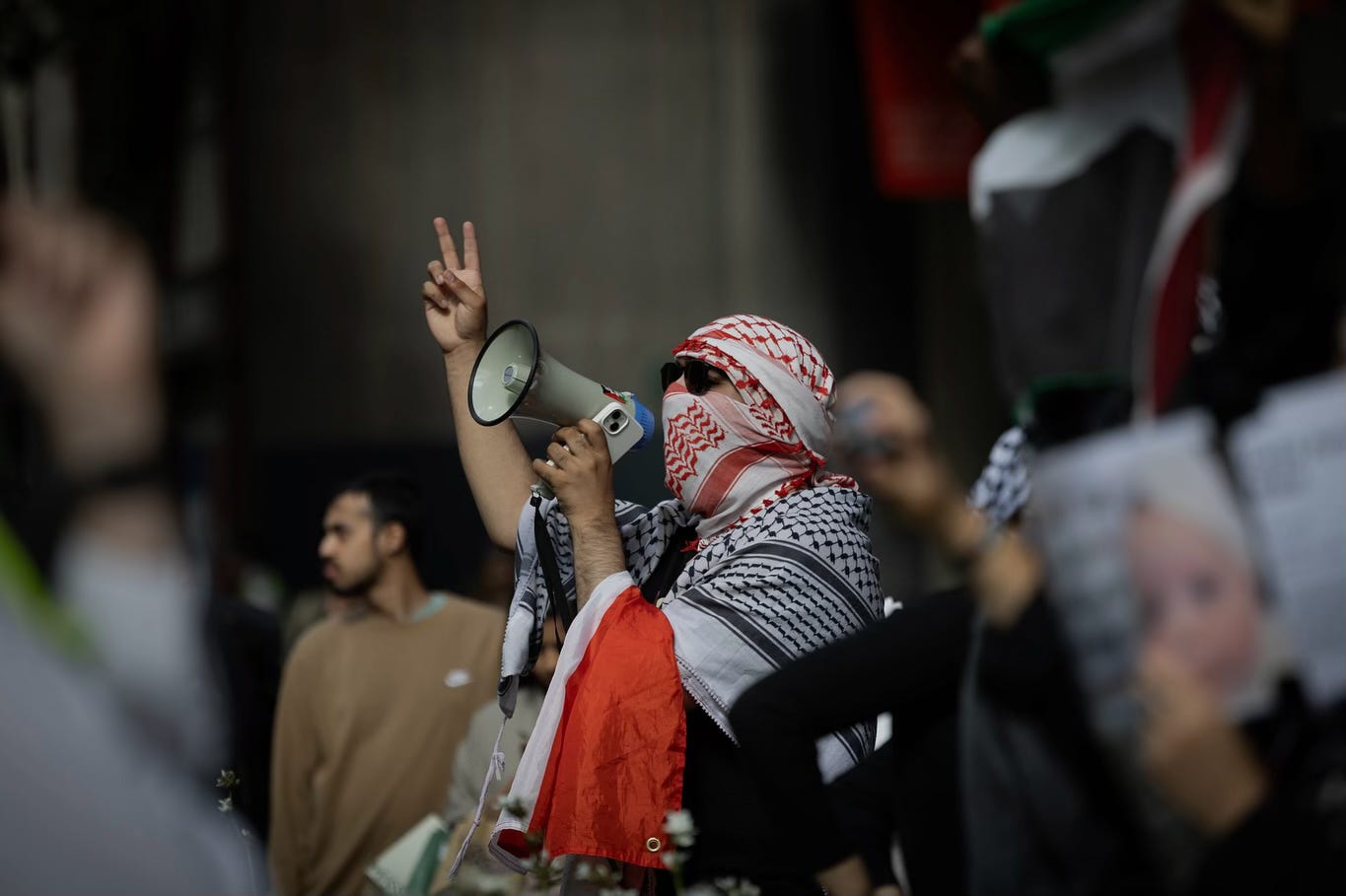We Must Not Forget: The Student Intifada, May 15-29
Nakba Day in the Netherlands, disruptions in the UK and hunger strikes in the US, and much more from The Student Intifada.
Welcome and welcome back.
On Tuesday, May 27, the U.S. and israel began their new “aid distribution” program; thousands of Palestinians, undergoing extreme famine due to a campaign of forced starvation by israel and its blockade on Gaza, attempted to enter the distribution site in Rafah. Almost instantly, IOF forces alongside American forces began shooting. 48 civilians were wounded and one person was killed. Shortly after the massacre, American and Western news agencies covered it as one caused by simple “chaos”. From blaming the crowds of Palestinians that have been starved of all forms of aid, to providing cover for IOF troops by promoting claims that they were simply “firing warning shots”, media from the imperial core continues to be reductive in their coverage of the genocide.
At the same time, however, a shift is gradually becoming visible. The US’s Gaza ‘Humanitarian’ Foundation, while clearly a cover for israel’s crimes and an attempt to excuse it as well as the US’s involvement by providing tepid (and intentionally chaotic) aid, represents an increasing understanding amongst those in power of how they will be remembered for their role in this genocide. As the US and the UK gradually try to distance themselves from the zionist entity, however slightly, it’s important to remember their role in the past 600 days of the modern-stage of israel’s 77-year long genocide.
As the global movement for the liberation of Palestine grows stronger, this realization is becoming more and more widespread. This does not mean a change in action. The US government and Trump administration, in spite of trying to frame themselves as hoping for an end to what they euphemistically refer to as the “conflict” in Gaza, still support israel, still send israel the guns that shoot Gaza’s children, still send israel the bombs and munitions it uses to raze and demolish universities and hospitals.
This realization isn’t just amongst world powers: over 400 authors recently signed an open letter calling for a ceasefire in Gaza, notably including British author Zadie Smith, who just last year published an essay complaining about pro-Palestine activism on college campuses. The Atlantic, too, shifted from providing defense for the murder of Palestinian children and arguing that it can be legal to covering the toll of this genocide on Gaza’s children. Paraphrasing from what political prisoner and journalist Mumia Abu-Jamal wrote of the Iraq War prior, the essential nature of government doesn’t change when opposition rises to its actions, the cycle just continues. Soon, the same politicians who called for this genocide and shook hands with the leaders of it will pretend that it never happened, or try to reframe themselves as ‘part of the resistance’; the institutions who were in favor of the false arrest of the CUNY 8, of the expulsion of students like Hannah Puelle and Yunseo Chung, students with morals and integrity, will use these students to rewrite their legacy as one of (administratively-accepted) protest. We must remember to never let them live this down. No matter how many fake, ‘humanitarian’ foundations they found, no matter how many open letters they sign – never forget means never forget.
Updates from the intifada, May 15-29
Mexico
On Sunday 18th, students at University of Guadalajara as well as community members, marched through the city in commemoration of the 77th anniversary of the Nakba, when 750,000 were forced to flee their land as a result of expulsion at the hands of zionist militias.
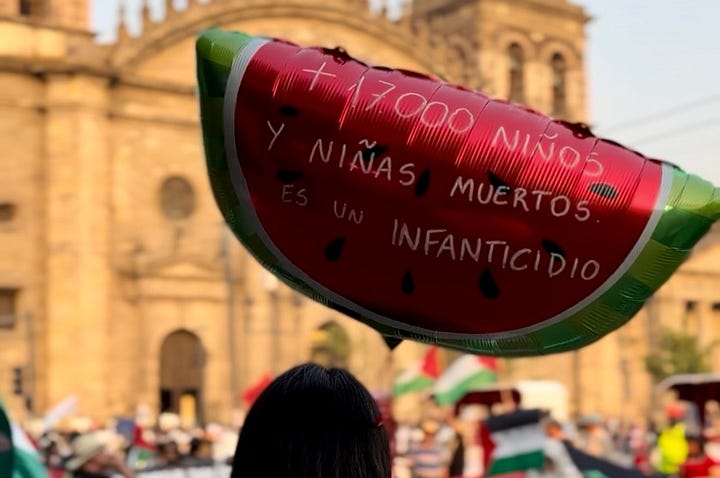
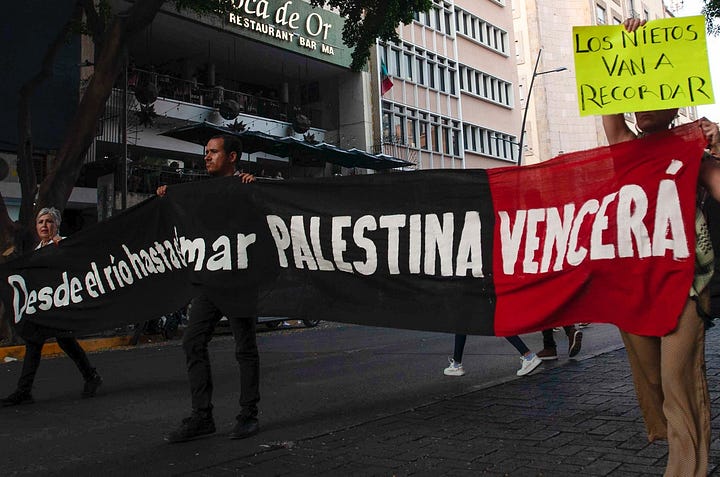
Senegal
Students at Cheick Anta Diop University forced israeli ambasador Yuval Waks to leave campus amid chants of ‘Free Palestine’ and ‘israel is a war criminal’, while waving Palestine fags. The ambassador had come to speak at a University conference on international relations As a consequence of the students' disruption, Waks was prevented from speaking and escorted out by security as protestors followed him off University grounds. We salute the brave actions of the Senegalese students! The students united will never be defeated!
USA
On Wednesday 21st, during Columbia University’s commencement, graduating students booed trustee Claire Shipman and chanted “Free Mahmoud” during her address. Mahmoud Khalil, a Columbia University student, was illegally detained by the Trump administration for his pro-Palestine activism. A day later, outside the university, alumni of the university alongside recent graduates protested the repression of student activism by burning their diplomas.
On Friday 23rd, students at Yale University ended their ten-day long hunger strike after experiencing health problems. The activists who took part in the action have had their access to campus suspended by administration.
Netherlands
The Yahya Sobeih Liberated Zone at the Radboud University (Nijmegen) is going strong, and is currently on its 17th day of encampment. The encampment has acted as the grounds for educational lectures and workshops, as well as several actions and protests.
On Thursday 15th, on Nakba Day, students organized a demonstration titled ‘Stop Funding Genocide’ to increase pressure on the university. On the same day, student activists disrupted an anniversary celebration of Radboud University stating, “We did not allow Radboud to celebrate their birthday celebration on Nakba Day. The theme of their celebration this year was ‘truth’. How ironic.” A graffiti action took place on the night of Sunday 18th, and a further action was organised on Monday 19th.
These actions were followed by a demonstration that took place on Wednesday 21st, which coincided with activists in Nijmegen (not directly linked to the encampment) who graffitied walls and windows of Radboud University with messages such as “>100K DEAD MURDERED IN YOUR NAME” and “CUT TIES”.
On Thursday 22nd, Radboud University students occupied the University Library.
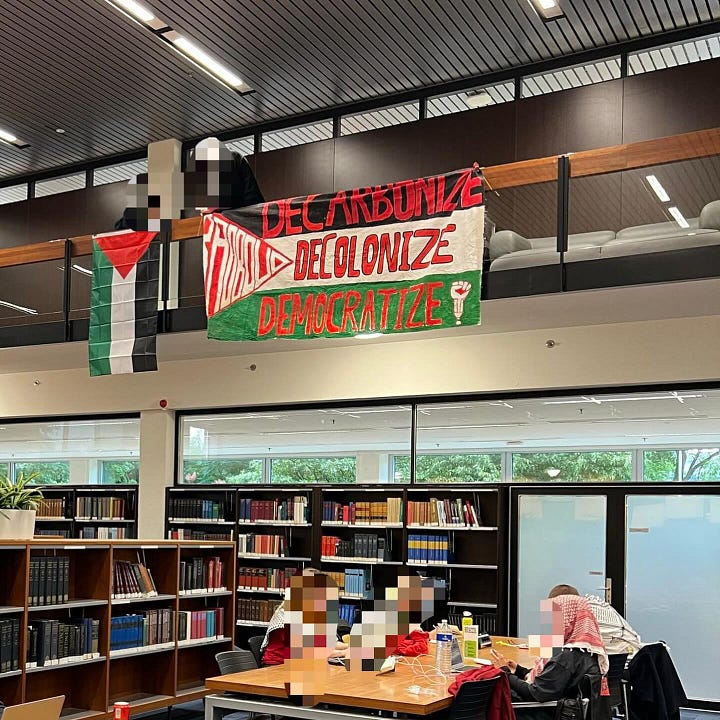
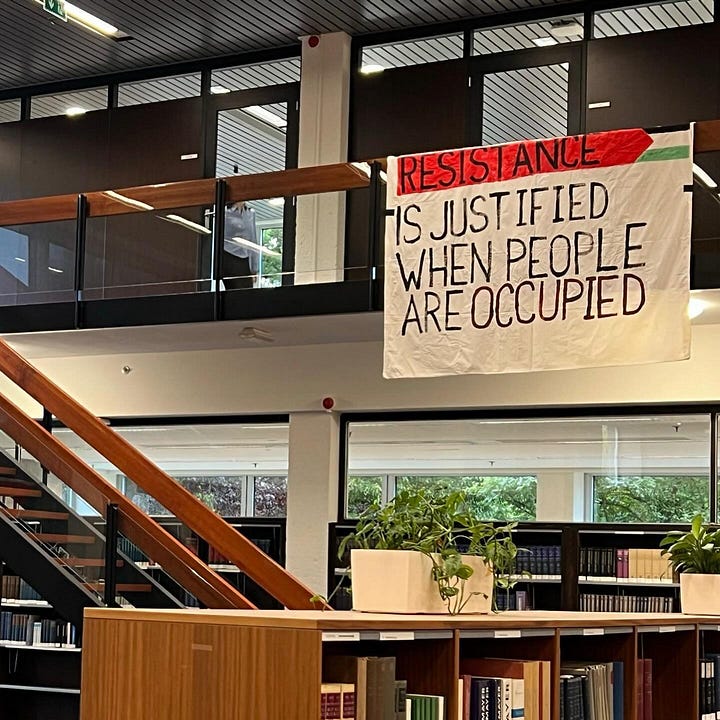
In Maastricht, on Tuesday 20th, student activists at Maastricht University formed a picket line at two MU faculties, impacting access to university activities and classes and were successful at disturbing ‘business as usual’ and drawing attention to the ongoing ties between the university and israeli institutions.
On Friday 23th, MU students activists organized a walk-out and demonstration around university buildings.
In Tilburg, on May 15th, Nakba Day, students at Tilburg University occupied a university building, renaming it the Hassan Eslayeh building. Later that night, the university called in riot police to remove the students. Police arrived in full riot gear, with shields and batons. The police dismantled the protest using disproportionate violence. For example, 22 students were arrested for protesting that night.
In Amsterdam, on Thursday 15th, students at Vrije Universiteit organized a sit-in of the main university building in remembrance of Nakba Day and Palestinian martyrs. On Tuesday 20th, students and staff hosted a ‘No Business/Work/Study as Usual’ session, with screenings, workshops, and teach-ins to learn about Palestine and activists legal rights.
In Utrecht, the Hossan Shabat Encampment at Utrecht University was evicted on May 19 by police, after activists successfully took over another building, the Drift 13 Hassan Eslaiah building. The encampment had hosted several actions and protests, including a demonstration on Nakba Day, on Thursday 15th. A video of the march can be seen here and here. There were also organised daily noise demonstrations on campus.
The eviction ended 13 days of occupation. The dismantlement of the encampment was brutal as Utrecht University called riot police onto campus, who proceeded to beat students with batons who were attending the legal support demonstration. At this protest, 43 students were detained.
The Hossan Shabat Encampment released a statement to attest that during the time of arrests, the pro-Palestine demonstration continued to grow, with neighbourhood residents, university students and staff blocking the arrestee bus and traffic in the area in support of the student activists. The statement read, “We want to thank the city of Utrecht for its heart-warming support. We will continue to take action again and again until our university stops working with genociders. Palestine’s will to survive, resist, and live in freedom and dignity will never die.”
The following day, activists organised a peaceful sit-in, however police were once again invited onto campus to break-up the demonstration.
In Groningen, on Wednesday 21st, the group, Students and Staff for Palestine at Groningen University (RUG) organized an ‘(Un)learning through Struggle’ event, including teach-outs, workshops, and fundraising.
In Rotterdam, after occupying Erasmus University for 5 days, student activists in the Liberated Zone Shireen Abu Akleh Square ended their encampment on Monday 19th. The Liberated Zone hosted workshops, lectures, screenings, and community lunch and dinner every day of protest.
UK
On Thursday 22nd, students at Warwick University ended their encampment.
On Friday 16th, students part of the Warwick stands with Palestine Coalition disrupted an event at the Warwick Arts Centre where the British comedian Jimmy Carr was performing. Students went up on stage and opened with a statement about the comedian’s alignment to the genocidal project and his participation in an ‘israeli independence day’ hosted at the British museum earlier in the month, where he entertained attendants. Campus security threatened to call police on the protestors and members of the audience later came down and physically assaulted the students. Students have called out Warwick University for hosting Jimmy Carr, saying that it ‘reveals a lack of ideological opposition to a man who has profited off the Gaza genocide and the erasure of history.’
On Monday 19th, students at Birmingham University began daily sit-in’s outside of the University’s library every lunchtime, in protest of the University’s $75 million worth of Universities investment in weapons companies and research partnerships. They have also called out the University for postponing negotiation meetings with students.
On Wednesday 21st, Kings College (Cambridge) committed to divest from arms industries and from the occupation of Palestine.
“This victory is one stop in the right direction, setting a significant precedent in the University, and for the student movements at large: it is immoral and unprofitable to maintain material complicity in genocide..Our movement cannot rest until total divestment has been achieved and Palestine is free from the river to the sea.” -Cambridge for Palestine
On Wednesday 21st, students at University of Manchester as well as wider community members, disrupted their University's board of governor meeting, where the University had failed to make the most important decision:cut ties with Tel Aviv University [TAU.] University Security guards responded with violence by assaulting students and dragging them out. Students called out the University's hypocrisy regarding their usual claims of ‘neutrality’ and ‘academic freedom’ , and have stated their determination in ensuring the University divests.
On the Wednesday 28th, students at King’s College London [KCL] protested the University’s hosting of the Global Network on Extremism and Technology [GNET], which is a summit which is backed by ‘surveilance giants and profiteers of occupation’ who are complicit in the Gaza genocide. These included companies such as Meta, Microsoft Youtube, Amazon and Airbnb who have been accused by students as being ‘Architects of genocide’ hiding behind ‘counter-extremism.’At the protest, where nearly 100 students attended, there was heavy police presence leading to harassment and assault of students, leading to two peaceful demonstrators being arrested. They were released after a few hours.
Parting thoughts
In his hallmark work Orientalism, Edward Said conceptualises “geographic imaginaries”, which he defines as “a vocabulary, a universe of representative discourse”. The language of the geographic imaginary is then used to affix specific meanings and produce specific knowledge about these spaces that then shape their perception and representation. Such an imaginary is one of the many tools in colonialism’s belt. The geographic imaginary of Palestine as “empty land”, as uncivilised and barbaric, has been used time and again as justification for the Nakba, for apartheid, for occupation, for genocide.
Now a new geographic imaginary is being created about Gaza. One that sees Gaza as just rubble, as just piles of dead bodies, as just a starving population that can’t even “accept aid properly”. We already see this imaginary now playing into the hands of the empire; with Trump seeing Gaza as prime real estate, with the israeli “left” demanding a ceasefire, with humanitarian organisations pleading for aid to be let in, with the imperial core distancing itself from the genocide.
Make no mistake, Gaza needs a ceasefire, and Gaza needs aid. When we make these demands as a movement, when we talk about Gaza and about Palestine, we must tread carefully so that we do not reinforce the same problematic vocabulary of this dystopian geographic imaginary, by reducing Palestine to death, destruction and starvation.
Because Palestine is so much more. Palestine is its people, its birds, its dabke, its food. It is its poetry, its music, its literature. It is our moral obligation to ensure that Palestine in our imagination is not reductive. Which is why, when we read Kanafani’s The Revolution of 1936–1939 in Palestine, we must also read Mother of Strangers by Suad Amiry. When we study the birth of Zionism, we must also study the Palestinian Sunbird.
When we think of Palestine, we (rightfully so) are immediately drawn to remembering scenes of extraordinary violence. But Palestine is so much more. We cannot forget. We must not forget.
In solidarity and resistance, The Student Intifada.
Written this week by comrades from the UK, USA and India



